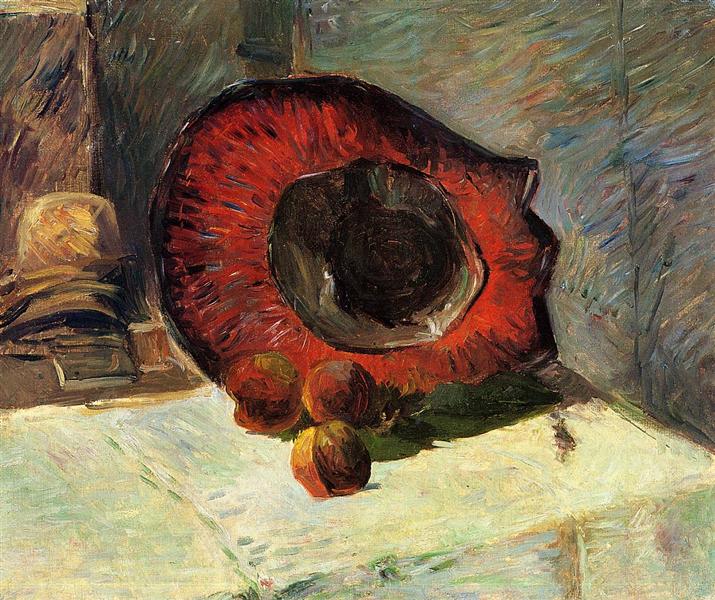Beschrijving
Paul Gauguin's painting "Red Hat" created in 1886 is an iconic work that encapsulates the essence of the artist's transition to a style that defies the conventions of realism to embrace a more symbolic and expressive vision. In this work, Gauguin demonstrates his mastery of color and form, inviting the viewer into an intimate exploration of the central figure, who wears a distinctively shaped red hat.
The figure depicted is a woman, whose presence is both enigmatic and alluring. The choice of such a vibrant hat is no coincidence; the red radiates energy and symbolism, deliberately contrasting with the more muted tones that predominate in the rest of the composition. This contrast in the color palette highlights Gauguin’s intentionality in directing our attention to the female figure, elevating her in the visual narrative.
Gauguin uses a composition that reflects his interest in simplifying forms and exalting colour. The woman is portrayed with stylised, almost schematic features, which align with the artist's post-impressionist approach. This stylisation not only creates an atmosphere of unreality, but also redefines the representation of everyday life, transforming the woman into a symbol of the culture and social life of her time.
The background of the work, composed of soft, earthy tones, suggests a scene that draws on the intimacy of a Balinese environment, where Gauguin spent a significant part of his life. The connection between the figure and its surroundings, although less pronounced in the palette, is effective, giving the work a sense of place and belonging. However, it is the figure with the red hat that establishes a powerful visual dialogue between the figure and the viewer, inviting them to reflect on identity and individuality in the context of the culture depicted.
The play of light and shadow is equally key in this piece. Gauguin employs an approach to lighting that does not seek to mimic reality, but rather aims to emphasize the volumetry and textures of the clothing, enhancing the dimensionality of the figure. This treatment of light also reveals the influence of other contemporary artistic movements, from the Impressionists to the Pre-Raphaelites, who explored light in innovative ways.
In the context of the development of painting as a means of expression, Red Hat aligns with Gauguin's desire to break with the strictly naturalistic heritage that characterized much of 19th-century art. His search for a more symbolic and emotional art became a precursor to Symbolism and, later, Modernism, thus paving the way for future artistic movements that would challenge traditional notions of representation.
In conclusion, “Red Hat” is more than a portrait; it is a celebration of color, form, and individuality, a testament to Paul Gauguin’s artistic genius. His ability to fuse stylized representation with deep symbolism not only defines this particular work, but also solidifies his place in art history as a pioneer of new forms of visual expression. Through this work, Gauguin invites us to question the reality around us and to see beyond the superficial, opening a space for dialogue between the observed and the felt, the known and the unknown.
KUADROS ©, a famous painting on your wall.
Hand-made oil painting reproductions, with the quality of professional artists and the distinctive seal of KUADROS ©.
Painting reproduction service with satisfaction guarantee. If you are not completely satisfied with the replica of your painting, we will refund 100% of your money.

